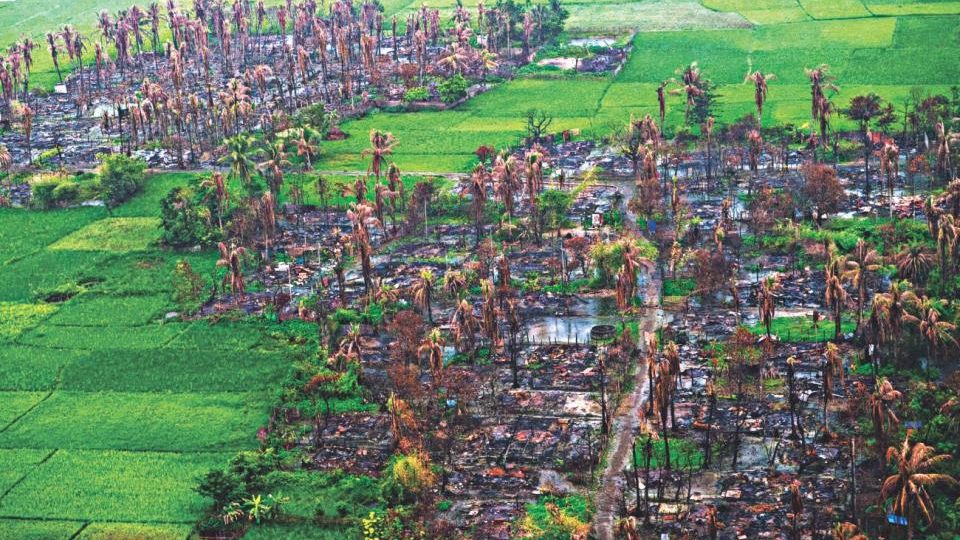Myanmar security forces slit the throats of Muslim Rohingya, burned victims alive, and gang-raped women and girls, according to two separate reports detailing mounting evidence of genocide against the minority group.
Human Rights Watch focused on the use of sexual violence in its report on the military’s campaign against the Rohingya, and concluded that the depredations amounted to crimes against humanity.
“Rape has been a prominent and devastating feature of the Burmese military’s campaign of ethnic cleansing against the Rohingya,” said Skye Wheeler, a researcher at Human Rights Watch and author of the report.
“The Burmese military’s barbaric acts of violence have left countless women and girls brutally harmed and traumatized.”
A separate report by the United States Holocaust Memorial Museum and Southeast Asia-based Fortify Rights documents “widespread and systematic attacks” on Rohingya civilians between October 9 and December of last year, and from August 25 of this year.
Crimes against humanity
The 30-page report, entitled “They tried to kill us all,” is based on more than 200 interviews with survivors and eyewitnesses, as well as international aid workers.
Some world leaders have already described as “ethnic cleansing” the scorched-earth military campaign against the Rohingya.
Evidence gathered by Fortify Rights and the Holocaust Museum demonstrates that “Myanmar state security forces and civilian perpetrators committed crimes against humanity and ethnic cleansing” during two waves of attacks in the majority Buddhist nation, the report says.
“There is mounting evidence to suggest these acts represent a genocide of the Rohingya population,” it says.
Almost 700,000 Rohingya, more than half of the population in northern Rakhine state, have been forcibly displaced since October last year when Myanmar’s army began “clearance operations” after a previously unknown group attacked and killed security officers.
Those operations were, in practice, “a mechanism to commit mass atrocities,” the report said.
“State security forces opened fire on Rohingya civilians from the land and sky. Soldiers and knife-wielding civilians hacked to death and slit the throats of Rohingya men, women, and children,” it said.
“Rohingya civilians were burned alive. Soldiers raped and gang-raped Rohingya women and girls and arbitrarily arrested men and boys en masse.”
The report said investigators from Fortify Rights and the Holocaust Museum’s Simon-Skjodt Center for the Prevention of Genocide traveled to Rakhine and the Bangladesh-Myanmar border area, where Rohingya have fled.
It quoted eyewitness testimony of mass killings in three villages in late August.
“When the killing was complete, soldiers moved bodies into piles and set them alight,” after soldiers reportedly murdered hundreds in one attack, the report said, adding to chilling and consistent accounts of widespread murder, rape and arson at the hands of security forces and Buddhist mobs.
Human Rights Watch, for its part, interviewed 29 rape survivors.
In every case but one, they were gang raped by two or more perpetrators. In eight cases, women and girls reported being raped by five or more soldiers.
Women described witnessing the murders of their young children, spouses, and parents before being raped. Many rape survivors said they endured days of agony walking with swollen and torn genitals to reach Bangladesh.
Human Rights Watch documented six cases of mass rape during which soldiers gathered women in groups before beating and gang-raping them.
The report quoted 33-year-old Mamtaz Yunis as saying soldiers trapped her and about 20 other women on the side of a hill after they fled their village and raped women in front of them.
Global outrage
Global outrage is building over the violence, while Myanmar’s army insists it has only targeted Rohingya rebels.
The watchdogs’ report came a day after Washington’s top diplomat, Secretary of State Rex Tillerson, said there were “credible reports of widespread atrocities committed by Myanmar’s security forces and vigilantes.”
Speaking during a visit to Myanmar, he urged authorities there to accept an independent investigation into those allegations.
The army and administration of de facto civilian leader Aung San Suu Kyi — a Nobel peace laureate — have dismissed reports of atrocities and refused to grant entry to UN investigators tasked with probing allegations of ethnic cleansing.
“Without urgent action, a risk of further outbreaks of mass atrocities exists in Rakhine state and possibly elsewhere in Myanmar,” Fortify Rights and the Holocaust Museum wrote.




